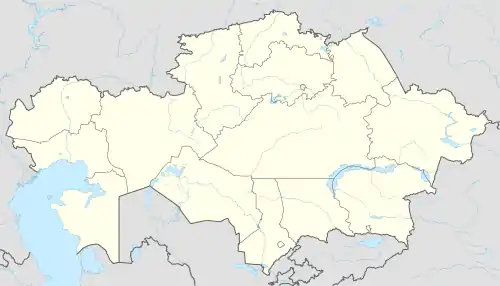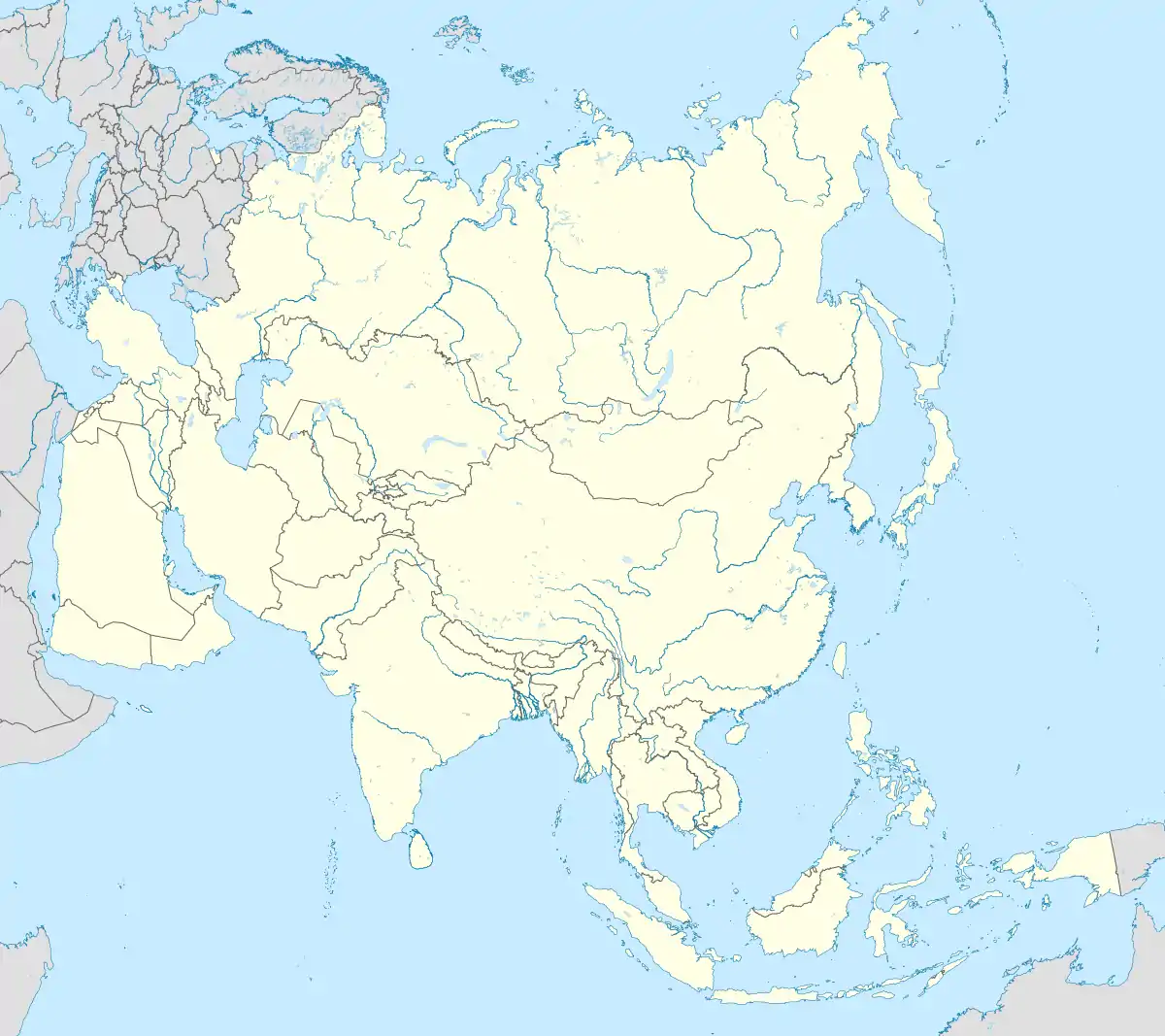Nursultan Nazarbayev International Airport
Nursultan Nazarbayev International Airport (IATA: NQZ, ICAO: UACC) (Kazakh: Халықаралық Нұрсұлтан Назарбаев Әуежайы, romanized: Halyqaralyq Nursultan Nazarbaev Áýejaıy; until June 2017 Astana International Airport) is an international airport in Akmola Region, Kazakhstan. It is the primary international airport serving Nur-Sultan, the capital city of Kazakhstan. The airport is the second-busiest international air passenger gateway into Central Asia (after Almaty International Airport), the 13th-busiest airport in the Post-Soviet states and the second-busiest airport in terms of passenger traffic in Kazakhstan, with 5,099,391 passengers in 2019.
Nursultan Nazarbayev International Airport Halyqaralyq Nursultan Nazarbaev Áýejaıy | |||||||||||
|---|---|---|---|---|---|---|---|---|---|---|---|
.jpg.webp) | |||||||||||
| Summary | |||||||||||
| Airport type | Public | ||||||||||
| Operator | JSC Astana International Airport | ||||||||||
| Serves | Nur-Sultan, Akmola Region | ||||||||||
| Location | Yesil District, Nur-Sultan, Kazakhstan | ||||||||||
| Opened | 1963 | ||||||||||
| Hub for | |||||||||||
| Focus city for | |||||||||||
| Time zone | ALMT (UTC+06:00) | ||||||||||
| Elevation AMSL | 355 m / 1,165 ft | ||||||||||
| Coordinates | 51°01′19″N 071°28′01″E | ||||||||||
| Website | nn-airport.kz | ||||||||||
| Map | |||||||||||
  | |||||||||||
| Runways | |||||||||||
| |||||||||||
| Statistics (2019) | |||||||||||
| |||||||||||
It is located in the Yesil administrative subdivision of Nur-Sultan, 16.7 km (10.4 mi) south-east of the city centre. The airport features two passenger terminals and one runway as well as cargo and maintenance facilities. The concept of T2 - terminal building has been designed by the late Japanese architect Kisho Kurokawa. It serves as the primary hub of Kazakhstan's flag carrier – Air Astana, and is the primary operating base for SCAT Airlines, low-cost carrier – FlyArystan, Qazaq Air and was also formerly a hub for Starlines Kazakhstan and Tselinograd OAO.
The facility opened in 1931 as Akmolinsk Airport and was renamed several times, previously known as Tselinograd Airport and then as Astana International Airport. With a government decree, the airport was renamed Nursultan Nazarbayev International Airport as a tribute to the first President. On 8 June 2020, the airport officially changed its three-character IATA airport code from TSE to NQZ.[2]
History
The airport was built in 1930, three kilometers away from Akmolinsk (now – Nur-Sultan) within the area of today's modern architectural tower of Baiterek. There was a square field for aircraft take-off and landing, adobe 8-room station with a small waiting hall, a two-room house for pilots and fuel storage on the airport territory. In December 1931, the first airfield of Nur-Sultan (formerly Astana) was built in 1931 on the outskirts of the town and was developed further after World War II. There was a square field for aircraft take-off and landing, adobe 8-room station with a small waiting hall, a two-room house for pilots and fuel storage on the airport territory. The regular air traffic was established between Semipalatinsk and Akmolinsk (day of enterprise establishment).[3]
At the water flood period, the aerodrome was closed. Communication between aerodrome and city was by phone, ferry (there was no bridge over Ishim River), by foot path. In the first few years the air traffic was ad-hoc by character, the timetables used to be as follows "aircraft departure on Monday morning" or "on Wednesday at sunrise". Transportation of passengers, mail and cargo were carried out by aircraft: Kalinin K-4, Kalinin K-5, Polikarpov R-5, Petlyakov Pe-2. The regular flights were established in 1934, with the following routes: 1. Alma-Ata – Karaganda – Akmolinsk – Atbasar – Kostanay – Sverdlovsk. Karaganda – Petropavlovsk – Korgalzhyn – Akmolinsk.[4]
In the beginning of 1946, the first group of Polikarpov Po-2 aircraft arrived to Akmolinsk for regular service. The group belonged to Karaganda aviation enterprise. The following routes were opened for passenger and mail transportation: Akmolinsk – Korgalzhyn – Aksu – Astrakhanka – Balkashino (settlements of Akmolinsk region). Operations division was organized consisting of 2 persons. In 1946 aviation began to render services for the national economy – medical aviation.[5]
From 1947 to 1948, the fleet consisting of three Polikarpov Po-2 aircraft was formed at the Akmolinsk airport base. This fleet was part of air group which was based in Karaganda. The airport was equipped with modern equipment (for that days), construction development has started: a Finnish house for radio station, three buildings and a garage were built. The total number of staff amounted to 40 – 50 persons. The airport has begun servicing heavier types of aircraft Lisunov Li-2 in addition to light aircraft. In November 1963, 04-th of November the airport of Tselinograd (formerly known as – Akmolinsk) accepted the first aircraft Ilyushin Il-18 in new terminal, located 18 km far from the city. Aircraft Ilyushin Il-18 in new terminal, located 18 km far from the city. On December, 1963 aircraft Ilyushin Il-18 began to operate on regular flights. The airport terminal was at a building stage, therefore the adapted 2-storeyed building served as air terminal, where the Air traffic control service has been located.[6]
In February 1966, the new air terminal was transferred into operation, and in June of the same year all services of united aviagroup relocated to the new airport. By 1969, the aircraft park of Tselinograd aviagroup has replenished with the first aircraft Antonov An-24. With reception of aircraft Antonov An-24 the volume of passenger, mail, and cargo transportation has sharply increased. People began to fly to many cities of the former Union on own airpark. In 1975, the aircraft Tupolev Tu-154 has firstly landed in the airport. Since this moment regular flight by aircraft Tupolev Tu-154 on Alma-Ata – Tselinograd – Moscow route and back has been opened. The historical mark for Akmola (Nur-Sultan) aviators was the change of the capital in 1998. Airdrome reconstruction begun and finished in a relatively short time: the runway with artificial covering was extended for about 3500 meters; taxiway and apron were also expanded. Replacements of light system and the radio navigating equipment; the VIP building was constructed, the airport complex was reconstructed.[7]
On 2 February 2005, a large-scale international airport reconstruction project has been completed. On 2 February 2005, the grand opening of the new passenger terminal of the airport took place. The terminal area was more than 25 thousand square meters. meters. Number of check-in counters - 24, 2 luggage straps. Currently, the terminal is used to service domestic flights and is called Terminal 2. On 19 November 2015, the grand opening of the business aviation terminal took place on 19 November 2015. The BAT area is 2,400 square meters, the capacity is 200 passengers per hour. The terminal building housed a lounge bar, a conference hall, rooms for negotiations, convenience for passengers with children, a duty-free shop, there are 52 parking spaces for guests.[8]
Within the framework of Infrastructure Development Program a new passenger terminal for international flights was built in 2017. 47,000 sq. M. The new terminal adds 6 new aircraft parking lots with landing sleeves and 4 bus landing routes to the airport infrastructure, and also includes a variety of technologies and processes designed to improve the quality of service at the airport.[9]
The "QZ" in NQZ
"N" stands for Nursultan Nazarbayev International Airport, as well as the name of the Kazakh capital of Nur-Sultan. "QZ" is an acronym for Qazaqstan according to the new version of Kazakh alphabet based on the Latin script.[10]
Facilities
The airport is the primary hub of Air Astana and is a primary operating base for SCAT Airlines, low-cost carrier – FlyArystan, Qazaq Air. It has two passenger terminals (T1 and T2), business aviation terminal as well as cargo and maintenance facilities. In 2019, it served 5,099,391 passengers, an increase of 12.1% compared to 2018, making it the second-busiest airport in Kazakhstan. The busiest single destination in passenger numbers is Almaty.
Runway
The airport resides at an elevation of 355 m (1,165 ft) above mean sea level. The airport has a single active runway in use designated 04/22 with an asphalt/concrete surface measuring 3,500 m × 45 m (11,483 ft × 148 ft). The airport is equipped with a Category IIIA (both directions) Instrument Landing System (ILS) approach to guide landing aircraft safely under very poor weather conditions and also allowing planes to land in low visibility conditions, such as fog. The airport is able to accommodate jets the size of the Il-76, Antonov An-124 Ruslan, Boeing 747-400F. It can also accept light aircraft and helicopters of all types.
| Direction | Length | Width | Surface | Operational Years | Last Major Improvement | Usage | ILS | Notes |
|---|---|---|---|---|---|---|---|---|
| 04/22 | 11,483 ft 3,500 m | 149 ft 45 m | Concrete/Asphalt | Primary runway | Cat. IIIA (both directions) | The runway is 3,500 metres long, with supporting taxiway systems. The runway is dedicated for arrivals and departures. |
Terminals
| Opened | 1 December 1931 | |
|---|---|---|
| Floor area | 70 892 m2 | |
| Handling capacity | 8 200 000 | |
| Parking bays | 12 (aerobridge) 92 (remote) | |
| Opened | 31 May 2017 | |
| Floor area | 47 000 m2 | |
| Handling capacity | 5 200 000 | |
| Parking bays | 6 (aerobridge) 4 (remote) | |
| Opened | 2 February 2005 | |
| Floor area | 23 892 m2 | |
| Handling capacity | 3 000 000 | |
| Parking bays | 6 (aerobridge) 4 (remote) | |
There are separate terminal buildings for domestic and international flights. Both terminals are adjacent, share a single car park and have a connecting corridor for transit passengers.
T1 – International Terminal
The new international terminal (labelled "T1") opened in June 2017.[11] Plans for the new terminal show 5–6 new departure gates complementing the gates in the previously existing terminal building.[12] 47,000 sq. M. and completed construction in time for the EXPO 2017, and took the role of T1 – International Terminal. The new terminal adds 6 new aircraft parking lots with landing sleeves and 4 bus landing routes to the Airport infrastructure, and also includes a variety of technologies and processes designed to improve the quality of service at the Airport. The new terminal has a public catering area of 1000 square meters, retail outlets occupy 1,300 square meters.
T2 – Domestic Terminal
The concept of T2 - terminal building has been designed by the late Japanese architect Kisho Kurokawa. With the opening of the new international terminal, the old terminal (now labelled "T2") is now dedicated to departures and arrivals of domestic flights. T2 - was the original and only terminal when the airport was reconstructed in 2005. On 2 February 2005, the grand opening of the T2 passenger terminal of the airport took place. The terminal area is more than 25 thousand square meters. Number of check-in counters - 24, 2 luggage straps. The design of the airport is the fusion of eastern and western traditions. The building has five floors, panoramic elevators, escalators, aerobridges, lounges and the system of automatic check-in for passengers, airport shops, restaurants, cafes, a pharmacy, a call-center, Wi-Fi and other.
Airlines and destinations
Passenger
The following airlines operate regular scheduled, seasonal and charter flights to and from Nur-Sultan:[13]
Notes
^a China Southern Airlines flies from Nur-Sultan to Guangzhou as CZ6014 with a stop-over in Urumqi. This flight is flown by a Boeing 737-800.[15]
Cargo
| Airlines | Destinations |
|---|---|
| Silk Way Airlines | Baku, Hong Kong |
| Turkish Cargo | Hong Kong, Istanbul–Atatürk |
Statistics
Passenger figures
| Year | Passengers | Change on previous year | Nursultan Nazarbayev International Airport Passenger Totals 2004–2019 | |
|---|---|---|---|---|
| 2004 | 496,240[16] |  | ||
| 2005 | 657,550[16] | |||
| 2006 | 834,299[17] |
|||
| 2007 | 1,171,000[17] |
|||
| 2008 | 1,316,000[17] |
|||
| 2009 | 1,309,000[17] |
|||
| 2010 | 1,620,000[17] |
|||
| 2011 | 1,984,000[17] |
|||
| 2012 | 2,303,143[16] | |||
| 2013 | 2,609,431[16] | |||
| 2014 | 2,960,181[16] | |||
| 2015 | 3,366,560[16] | |||
| 2016 | 3,452,714[16] | |||
| 2017 | 4,294,145[16] | |||
| 2018 | 4,545,373[16] | |||
| 2019 | 5,099,391[16] | |||
| Source: Nursultan Nazarbayev International Airport[18] | ||||
Busiest routes
Almaty International Airport was the most popular domestic route with 144 weekly flights.
| Rank | Region | City | Airport(s) | IATA | Weekly Departures | Airlines |
|---|---|---|---|---|---|---|
| 1. | Almaty | Almaty International Airport | ALA | 144 | Air Astana, FlyArystan, Qazaq Air, SCAT Airlines | |
| 2. | Shymkent | Shymkent International Airport | CIT | 41 | Air Astana, FlyArystan, Qazaq Air, SCAT Airlines | |
| 3. | Atyrau | Atyrau International Airport | GUW | 33 | Air Astana, FlyArystan, Qazaq Air, SCAT Airlines | |
| 4. | Oskemen | Oskemen Airport | UKK | 30 | Air Astana, Qazaq Air, SCAT Airlines | |
| 5. | Aktobe | Aktobe International Airport | AKX | 29 | Air Astana, FlyArystan, Qazaq Air, SCAT Airlines | |
| 6. | Aktau | Aktau International Airport | SCO | 19 | Air Astana, SCAT Airlines | |
| 7. | Taraz | Aulie-Ata International Airport | DMB | 19 | SCAT Airlines | |
| 8. | Kostanay | Kostanay Airport | KSN | 17 | FlyArystan, Qazaq Air, SCAT Airlines | |
| 9. | Kyzylorda | Kyzylorda Airport | KZO | 13 | Air Astana, FlyArystan | |
| 10. | Oral | Oral Ak Zhol Airport | URA | 10 | Air Astana | |
| Sources: Statistics[19] | ||||||
| Rank | Country | City | Airport(s) | IATA | Weekly Departures | Airlines |
|---|---|---|---|---|---|---|
| 1. | Istanbul | Istanbul Airport | IST | 12 | Air Astana, Turkish Airlines | |
| 2. | Frankfurt am Main | Frankfurt am Main International Airport | FRA | 10 | Air Astana, Lufthansa | |
| 3. | Dubai | Dubai International Airport | DXB | 10 | Air Astana, flydubai | |
| 4. | Beijing | Beijing Capital International Airport | PEK | 6 | Air Astana, Air China | |
| 5. | Urumqi | Ürümqi Diwopu International Airport | URC | 5 | Air Astana, China Southern Airlines | |
| 6. | London | Heathrow Airport | LHR | 4 | Air Astana | |
| 7. | Warsaw | Warsaw Frederic Chopin Airport | WAW | 3 | LOT Polish Airlines | |
| 8. | Abu Dhabi | Abu Dhabi International Airport | AUH | 2 | Etihad Airways | |
| 9. | Paris | Paris Charles de Gaulle Airport | CGD | 2 | Air Astana | |
| 10. | Seoul | Incheon International Airport | ICN | 2 | Air Astana | |
| Sources: Statistics[19] | ||||||
Access
Bus
No. 10 and 12 municipal bus lines connects the airport with the city centre of Nur-Sultan. Service is available from 06:00 to 22:00 and run from the airport (just outside the airport) to the city center and vice versa with intermediate stops in between. The single fare is ![]() 150.
150.
Car and taxi
The airport is located on the Regional Road P3, about 16.7 kilometers (12 mi) from the city center and about 25 minutes drive, depending on traffic. There is extensive car and motorcycle parking space available. Taxis are also available directly outside the terminal building at the airport parking lot (Yandex.Taxi and inDriver). Many taxi companies offer a flat-rate for to/from Airport trips (the rate is usually ![]() 1,650), booked via mobile app.
1,650), booked via mobile app.
See also
- Transport in Kazakhstan
- List of airports in Kazakhstan
- Kokshetau International Airport (located in Akmola Region 287 km (178 mi) from Nur-Sultan)
- List of the busiest airports in the former USSR
References
- AIP Kazakhstan
- "Переименован он теперь". Время (in Russian). Retrieved 26 June 2020.
- "History; Get know the history of the Airport". nn-airport.kz. Retrieved 13 August 2020.
- "History; Get know the history of the Airport". nn-airport.kz. Retrieved 13 August 2020.
- "History; Get know the history of the Airport". nn-airport.kz. Retrieved 13 August 2020.
- "History; Get know the history of the Airport". nn-airport.kz. Retrieved 13 August 2020.
- "History; Get know the history of the Airport". nn-airport.kz. Retrieved 13 August 2020.
- "History; Get know the history of the Airport". nn-airport.kz. Retrieved 13 August 2020.
- "History; Get know the history of the Airport". nn-airport.kz. Retrieved 13 August 2020.
- "Nursultan Nazarbayev International Airport code officially changes to NQZ". Retrieved 9 June 2020.
- "Astana International Airport's new terminal takes the first international flight". Central Asia Aero News. Archived from the original on 12 August 2017. Retrieved 12 June 2017.
- "Astana International Airport Kazakhstan". Mabetex. Retrieved 11 January 2017.
- "Nursultan Nazarbayev International Airport Flight Schedule". Retrieved 23 November 2019.
- Liu, Jim. "Qatar Airways NS20 Network changes as of 19MAR20". Routesonline. Retrieved 19 March 2020.
- L, J (14 March 2019). "China Southern Airlines to commence Guangzhou-Urumqi-Astana service". CAPA.
- http://www.kase.kz/files/emitters/ARAL/aralp_2016_rus.pdf Количество обслуженных пассажиров в аэропортах Республики Казахстан за 2015-2016 гг.стр 39
- "Аэропорт Астана - показатели динамики развития пассажиропотока за 2006-2011". Archived from the original on 15 March 2012. Retrieved 25 October 2019.
- https://www.nn-airport.kz/pages/passenger_traffic
- "Nursultan Nazarbayev International Airport". Flightradar24. Retrieved 14 October 2019.
External links
![]() Media related to Nursultan Nazarbayev International Airport at Wikimedia Commons
Media related to Nursultan Nazarbayev International Airport at Wikimedia Commons
- Nursultan Nazarbayev International Airport (official site) (in English, Kazakh, and Russian)
- Current weather for UACC at NOAA/NWS
- Accident history for TSE at Aviation Safety Network